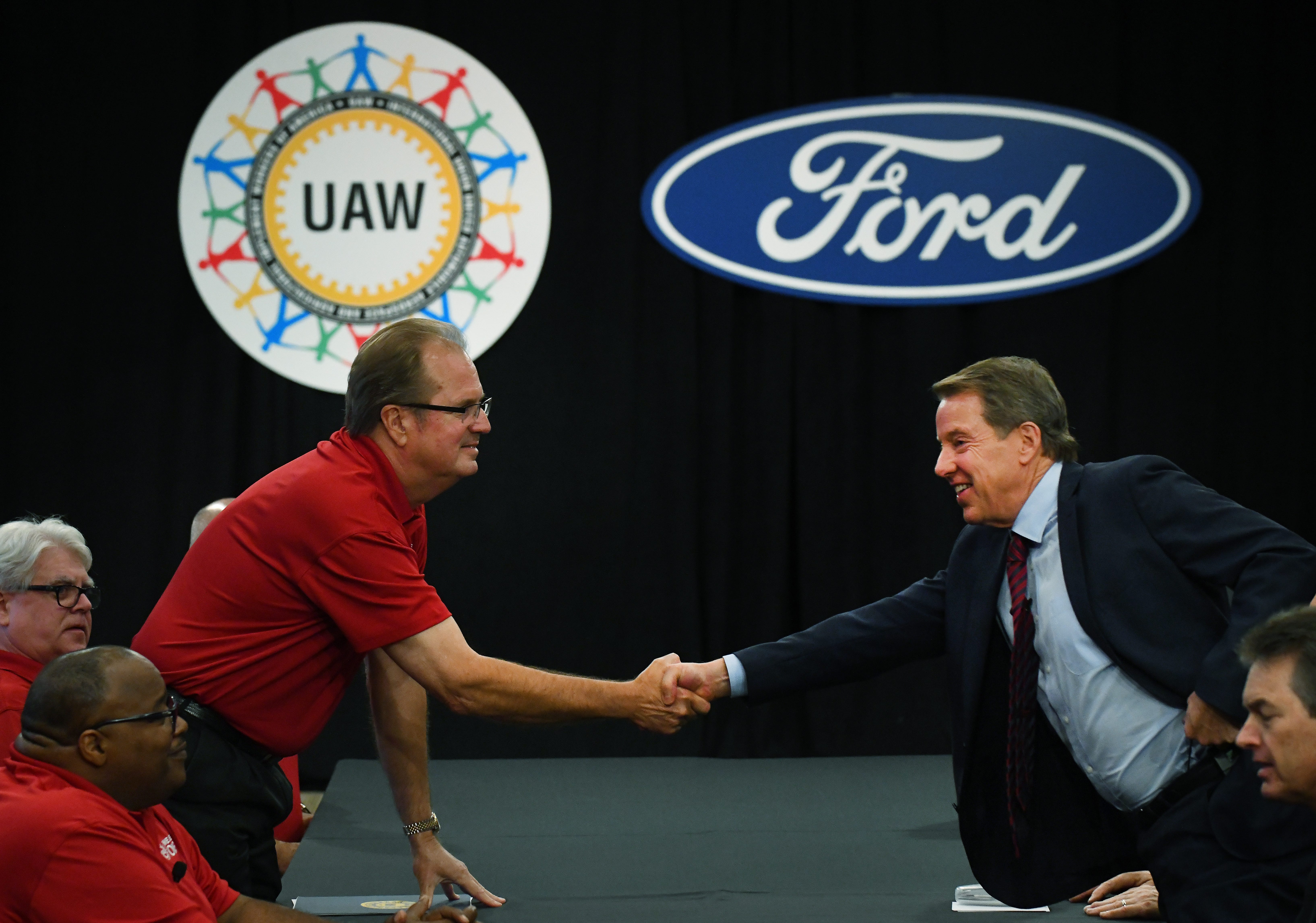As auto talks open, a wide divide separates Detroit carmakers, UAW
 Breana Noble
Breana Noble
Dearborn — Ford Motor Co. and United Auto Workers leaders stretched across the table Monday for the traditional opening handshake that opens contract negotiations.
The divide between the two stretches much wider, however: On one side is an automaker coming off a stretch of record profits, but is trying to cut costs to prepare for an autonomous and electric future. On the other side, the labor union is looking for job security and a piece of the fat profits all three Detroit automakers reported annually since workers ratified the last contract in 2015.
UAW President Gary Jones set the tone for negotiations with the Detroit Three automakers Monday at Ford's world headquarters in Dearborn, demanding that laborers get what is due to them. The opening handshakes for General Motors Co. and Fiat Chrysler Automobiles take place Tuesday.
"Despite record corporate profits, we've been watching a race to the bottom over the past several years for working men and women in this country," Jones said. "... This must stop."
When the current contract expires Sept. 14, automakers want deals to curb spending over the next several years in anticipation of a downturn.
"What we did together to save our company in '08 and '09 and the sacrifices back then, that will be something I will remember for the rest of my life," Ford Executive Chairman Bill Ford Jr. said Monday. "I’ve never made the distinction between hourly and salary — we’re one family here. There will be tough issues, and we will have disagreements. We always do. But we always do what is right for the company. I expect that to happen this time."
But four years since the last round of bargaining, expensive bets on future technology and an uncertain regulatory and trade environment make for complex negotiations.
"There is some room in the world like this with people unlike us who are looking to try to take our business, probably tech companies," Ford CEO Jim Hackett said. "They think one day all the cars will be made up of software and contract manufacturing. We don't believe that. We think one of the challenges they have had in doing this is the people in red who understand what it means to build a vehicle and do it with quality and consistency and reliability."
Experts say those working in the plants are most concerned with job stability and what electrification, autonomous vehicles and declining sales will mean for their jobs. They also say the UAW will be less likely to bend on issues like health care costs, wage increases, temporary employees and future product allocation. And that could lead to strikes — a possibility for which the union has prepared by increasing strike pay.
"There were no surprises in terms of the kickoff," said Kristin Dziczek, vice president of industry, labor and economics at the Center for Automotive Research in Ann Arbor. "They shake hands, say we're committed to making a deal, but we're going to be tough if we have to be."
Jones said the UAW would work to fight against companies paying lower wages in the United States, Mexico, China and elsewhere, protect temporary employees and shorten the eight-year timeline negotiated in 2015 to bring former tier-two workers to the top of the pay scale. He added that representatives would look to ensure its 156,000 members have the training, tools and safe environment to keep up with the industry's advancements.
Jones also took aim at Ford's partnership with Volkswagen AG in Europe. His comments come after another attempt to organize workers at VW's plant in Chattanooga, Tennessee, failed last month.
"Volkswagen was not friendly to the UAW in Chattanooga, and we will look very hard and with great concern at any alliance with them or any other non-labor friendly company," Jones said.
That partnership announced in January will produce commercial trucks and vans outside North America. On Friday, the automakers added an electric vehicle in Europe to that list. All are outside the UAW's scope in the United States. VW, however, will invest $2.6 billion into Argo AI LLC, a Pittsburgh self-driving software company in which Ford also is a stakeholder.
"We have lots of conversations with the UAW on lots of subjects, so we’ll listen to their concerns and see what effect it has on Ford," said Joe Hinrichs, Ford's president of automotive. "We’re confident the project and the alliance that we’ve set forth in Volkswagen makes good sense for Ford."
While the UAW is expected to angle for assurance on wage increases in place of profit-sharing or lump sums dependent on profits, automakers are expected to focus on reducing health care costs, adding more temporary workers to the lines and prepping plants for more products they don't make many of yet, such as autonomous or electric vehicles.
In a word, Hinrichs said it is about keeping Ford competitive. Principally, that has to do with the automaker's cost structure, he said. Average hourly labor costs for international producers in the U.S. is estimated to be $50 per hour compared to Ford's $61, FCA's $55 and GM's $63, according to the Center for Automotive Research.
Under Hackett, Ford has been on a cost-cutting path for most of the past two years. The automaker aims to trim $25.5 billion in operational costs while spending $11 billion to restructure the company. In May, Ford said it will have cut 7,000 white-collar jobs globally by August. Last month, it added it would trim some 12,000 jobs in Europe and close or sell six plants there.
The company is proud of the current utilization rates of its plants, Hinrichs said, though he added changes in the industry could alter that.
"The conversations we have, the discussions we have are always taking place," Hinrichs said. "We know that the UAW and Ford will work together to find solutions to be competitive and that over time, that’s who wins."
Under the 2015 agreements, UAW employees pay as little as 4% out of pocket for coverage. Some aren't required to have a primary-care physician. All three automakers are expected to try to negotiate a plan that would place more cost on the employees.
The companies are expected to negotiate for more temporary workers. The 2015 agreements varied for each automaker on when and how the automakers could hire or use temporary workers. The UAW has said the "temporary" designation is meant for people who fill in on the line in case of absences or time off, much like substitute teachers. Those employees don't get the same benefits as full-time UAW workers.
The automakers argue that temporary workers protect against layoffs. They also have processes that would allow temporary workers to become full-time employees in some cases.
Despite the automakers' profits in recent years, UAW spokesman Brian Rothenberg maintained that the 2015 contracts were "good for workers and good for companies."
That is the hope Jones expressed for this year's negotiations, too: "We will protect our work, our jobs and our way of life. We expect an agreement that recognizes our contributions to profitability and looks ahead with Ford Motor Company to a very prosperous future."
bnoble@detroitnews.com
(313) 222-2429
Twitter: @BreanaCNoble